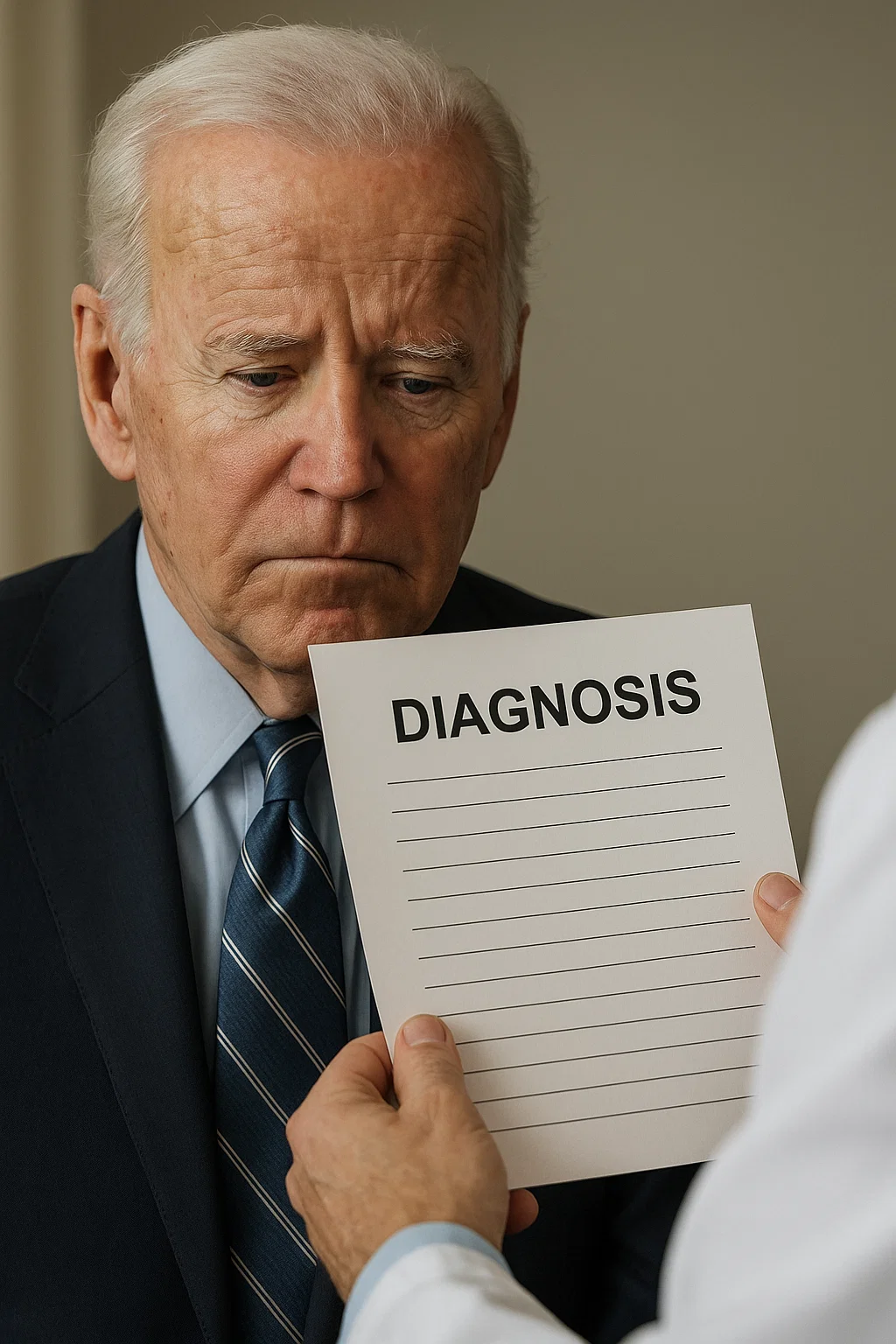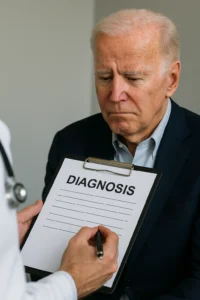Introduction: Why Joe Biden’s Diagnosis Matters
Health has always been a central issue for political leaders, especially when it involves a sitting U.S. president. When the phrase “Joe Biden diagnosis” trends in the news cycle, it sparks immediate concern—not only about the president’s personal well-being but also about the future of American leadership, governance, and public trust.
At 82, Joe Biden remains the oldest sitting U.S. president in history. His health is under constant media scrutiny, with every medical report, minor stumble, or routine checkup analyzed in detail. For citizens, investors, and global partners alike, Biden’s diagnosis—whatever it may be—becomes more than just a medical update. It becomes a matter of national and international stability.
This article explores what’s known about Biden’s health, how presidential diagnoses are communicated to the public, the political stakes involved, and why transparency matters more than ever in 2025.
(Internal link suggestion: Learn more about modern news cycles, media transparency, and digital reporting on RankRise1)
1. Presidential Health and Public Responsibility
The health of U.S. presidents has always been a public matter. From Franklin D. Roosevelt’s polio to John F. Kennedy’s Addison’s disease, history shows that presidents often balance private medical issues with the public’s right to know.
Joe Biden’s diagnosis, regardless of its nature, follows this tradition. The White House physician provides periodic updates, but the level of detail varies depending on political sensitivity. Citizens expect transparency because a president’s health affects:
- Decision-making capacity
- National security
- Economic confidence
- International diplomacy
Thus, when the term “Joe Biden diagnosis” trends, it isn’t just gossip—it’s a serious matter tied to democratic accountability.
2. Joe Biden’s Known Medical History
President Biden has released several medical reports over the years, confirming he is in generally good health for his age. Notable points include:
- Atrial fibrillation (AFib): A common irregular heartbeat, managed with medication.
- Past aneurysm surgeries: In the late 1980s, Biden underwent operations to correct two life-threatening brain aneurysms.
- Arthritis and stiffness: Typical for his age, occasionally affecting his gait.
- Cancer warnings: Biden himself has previously acknowledged having non-melanoma skin cancers removed.
These conditions are not unusual for someone in their eighties, but because of his office, each detail carries political weight.
3. The Latest Buzz Around “Joe Biden Diagnosis”
In early 2025, discussions about Biden’s diagnosis resurfaced after news reports speculated on both his fitness for office and future election campaigns.
👉 For a related news development, see this NBC News report, which highlights both Biden’s long-standing cancer concerns and broader issues shaping U.S. political narratives.
This kind of coverage fuels debates over:
- Whether the president should undergo more frequent and detailed health evaluations.
- How much the White House should disclose versus keep private.
- What impact his diagnosis could have on 2026 midterms and 2028 succession planning.
The lack of full transparency leaves room for speculation, misinformation, and partisan spin, which can quickly spread across social media.
4. Media, Misinformation, and Public Reaction
Whenever “Joe Biden diagnosis” makes headlines, two things happen simultaneously:
- Mainstream media outlets report cautiously, waiting for official confirmations.
- Social media platforms explode with speculation, memes, and conspiracy theories.
This dynamic is not new. Public figures often face a distorted information cycle, where rumor spreads faster than fact. For Biden, this means that even a routine doctor’s visit can spiral into trending hashtags about resignation or incapacity.
For citizens, the challenge is learning how to separate credible health reports from political noise.
5. Political Implications of a Presidential Diagnosis
A sitting president’s health isn’t only about personal well-being—it carries enormous political consequences. For Joe Biden, any diagnosis triggers questions like:
- Continuity of leadership: Would Vice President Kamala Harris take on more duties if Biden’s health declines?
- Election prospects: Could a serious diagnosis impact his decision to run again, or influence Democratic Party strategy?
- Global diplomacy: Allies and rivals alike watch closely. A perceived weakness could embolden adversaries or unsettle markets.
The U.S. Constitution has provisions—such as the 25th Amendment—to handle presidential incapacity. But in practice, invoking such measures is politically sensitive and rarely used.
6. Transparency vs. Privacy: The Ongoing Debate
Should the president disclose every detail of his medical history? Opinions are divided:
- Transparency advocates argue that because Biden’s decisions affect 330 million people, the public deserves full disclosure.
- Privacy defenders counter that, like any citizen, the president should keep certain medical matters private unless they impair his duties.
Biden’s team generally opts for a middle ground: releasing annual physical results while withholding unnecessary details. Still, critics argue that vague language fuels suspicion rather than builds trust.
7. Comparing Biden’s Diagnosis to Past Presidents
Looking at history, Joe Biden’s diagnosis fits into a long tradition of medical scrutiny for U.S. leaders:
- Dwight Eisenhower had heart attacks while in office but maintained transparency.
- Ronald Reagan underwent cancer surgery while president, sparking debate on succession.
- Donald Trump faced speculation about his health during COVID-19, with accusations of limited transparency.
Biden’s situation is not unique, but the 24/7 news cycle and social media age amplify every detail, making public reaction swifter and more polarized.
8. Commercial and Strategic Elements (5% Angle)
For healthcare providers, pharmaceutical companies, and wellness brands, presidential diagnoses can indirectly boost public awareness of certain conditions.
- Medical technology firms highlight advancements in cardiovascular and cancer care.
- Wellness brands frame discussions around aging gracefully and maintaining energy in later life.
- Political consulting firms leverage health narratives in campaign strategies.
While these commercial aspects are small, they reflect how a single diagnosis can ripple into economic and cultural spheres beyond politics.
9. Humanizing the Story: Beyond Politics
It’s easy to reduce “Joe Biden diagnosis” to political theater. But at its core, this is about an 82-year-old man balancing health, family, and duty. Biden has lived through immense personal tragedies—losing his first wife and daughter in a car crash, and later his son Beau to brain cancer.
These experiences humanize him. They also help explain why Biden often emphasizes healthcare policy, cancer research, and family resilience in his speeches. His diagnosis—whatever form it takes—becomes a deeply personal yet nationally significant issue.
Conclusion: What Biden’s Diagnosis Means for America
The phrase “Joe Biden diagnosis” will continue to trend as long as he remains president. Every report, update, and rumor will feed into larger conversations about:
- Presidential transparency
- Political stability
- The human side of leadership
Ultimately, Biden’s health story reminds us that presidents are human beings first, leaders second. Their diagnoses reflect not only medical realities but also the hopes, fears, and expectations of a nation.
(Internal link suggestion: Stay updated with political insights, SEO-driven news coverage, and digital media strategies on RankRise1)
Top 10 References (Authoritative Sources)
- NBC News – Joe Biden Cancer Discussion
- White House Physician Annual Reports
- The Guardian – Presidential Health and Transparency
- New York Times – Biden’s Health Updates
- BBC News – Global Reactions to Biden’s Health
- CNN Politics – Medical History of Presidents
- Politico – 25th Amendment Explained
- History.com – Presidential Health Scandals
- Mayo Clinic – Atrial Fibrillation Overview
- American Cancer Society – Skin Cancer Facts







